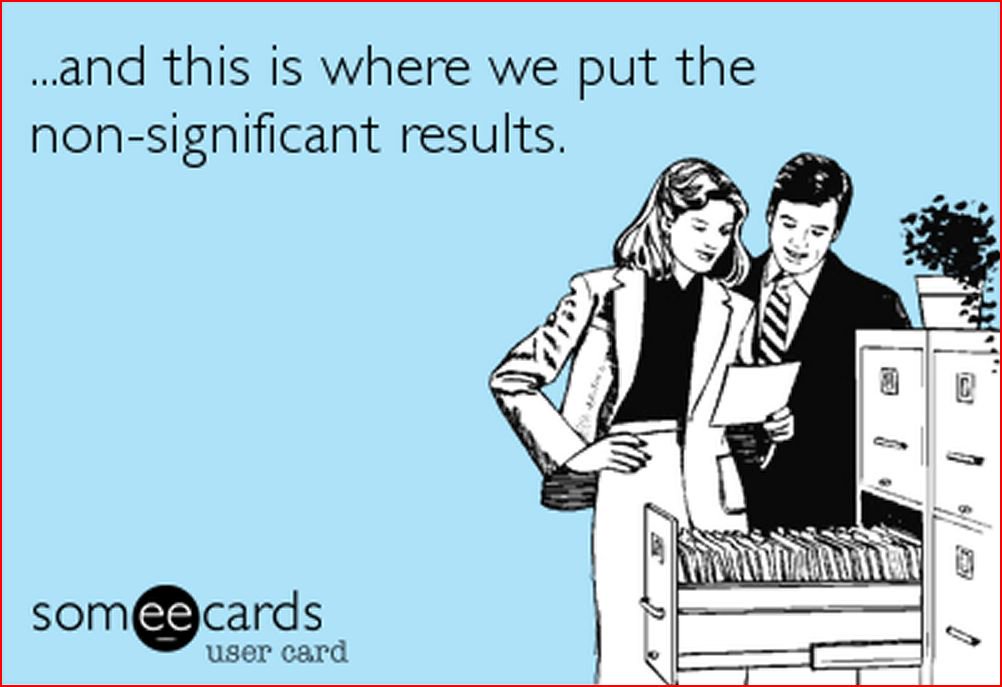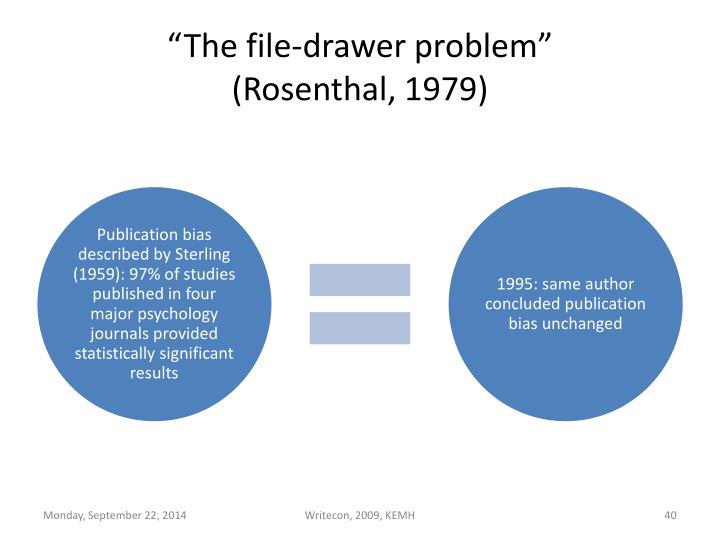The File Drawer Problem
The File Drawer Problem - The file drawer problem (or publication bias ) refers to the selective reporting of scientific findings. Failure to report all the findings of a clinical trial breaks the core value of honesty, trustworthiness and integrity of the researchers. Web the file drawer problem is likely to be even more of a problem when studies have inadequate power. Web this is a problem experienced not only in campaign evaluation but in intervention research more generally (what rosenthal dubbed the ‘file drawer problem’). Publication bias is more widespread than scientists might like to think. Web for any given research area, one cannot tell how many studies have been conducted but never reported. Web steward health care system llc filed for bankruptcy early monday after a period of mounting financial challenges and government scrutiny over the impact of its hospital closures on patients. It describes the tendency of researchers to publish positive results much more readily than negative results, which “end up in the researcher’s drawer.” In psychology, “the file drawer effect,” coined in 1979 by robert rosenthal, refers to the fact that in science many results remain unpublished, especially negative ones. We conducted 5 studies to assess the extent of the file drawer. Web the file drawer problem is likely to be even more of a problem when studies have inadequate power. Publication bias is more widespread than scientists might like to think. A research with potential implications for a wider society lays wasted. Web what is the file drawer problem? Over the past 40 years since the term file drawer was coined,. Failure to report all the findings of a clinical trial breaks the core value of honesty, trustworthiness and integrity of the researchers. Web for any given research area, one cannot tell how many studies have been conducted but never reported. The file drawer problem reflects the influence of the results of a study on whether. We conducted 5 studies to. Web the file drawer problem is likely to be even more of a problem when studies have inadequate power. In 1979, robert rosenthal coined the term “file drawer problem” to describe the tendency of researchers to publish positive results much more readily than negative results, skewing our ability to discern exactly what an accumulating body of knowledge actually means [1].. The term file drawer problem was coined by psychologist robert rosenthal in 1979. Selective reporting of scientific findings is often referred to as the “file drawer” problem ( 2 ). Web fixed an issue which could cause file explorer to crash sometimes when going from the search box to the body of file explorer. Publication bias arises whenever the probability. This term suggests that results not supporting the hypotheses of researchers often go no further than the researchers' file drawers, leading to a bias in published research. Selective reporting of scientific findings is often referred to as the “file drawer” problem ( 2 ). Web what is the file drawer problem? We conducted 5 studies to assess the extent of. [other] fixed an issue that was causing some people to repeatedly see a message saying live captions were being missed. Web the file drawer problem (or publication bias) refers to the selective reporting of scientific findings. It has been contended that drug companies have hidden, in the “file drawer,” the results of unsuccessful clinical trials while publishing the results of. Web the file drawer problem is a phenomenon wherein studies with significant results are more likely to be published (rothstein, 2008 ), which can result in an inaccurate representation of the effects of interest. The file drawer problem reflects the influence of the results of a study on whether. Web the file drawer problem (or publication bias) refers to the. Failure to report all the findings of a clinical trial breaks the core value of honesty, trustworthiness and integrity of the researchers. [other] fixed an issue that was causing some people to repeatedly see a message saying live captions were being missed. We conducted 5 studies to assess the extent of the file drawer. The term file drawer problem was. We conducted 5 studies to assess the extent of the file drawer. Quantitative procedures for computing the tolerance for filed and future null results are reported and illustrated, and the. Over the past 40 years since the term file drawer was coined, contributors to psychological science have Such a selection process increases the likelihood. Web this is a problem experienced. Web the extreme view of the file drawer problem is that journals are filled with the 5% of the studies that show type i errors, while the file drawers are filled with the 95% of the studies that show nonsignificant results. The file drawer problem reflects the influence of the results of a study on whether. In psychology, “the file. Such a selection process increases the likelihood. It describes the tendency of researchers to publish positive results much more readily than negative results, which “end up in the researcher’s drawer.”. Web steward health care system llc filed for bankruptcy early monday after a period of mounting financial challenges and government scrutiny over the impact of its hospital closures on patients. Quantitative procedures for computing the tolerance for filed and future null results are reported and illustrated, and the. A research with potential implications for a wider society lays wasted. The file drawer problem may also create a waste of research resources by impeding the quick correction of false positive findings. Failure to report all the findings of a clinical trial breaks the core value of honesty, trustworthiness and integrity of the researchers. The extreme view of the file drawer problem is that journals are filled with the 5% of the studies that show type i errors, while the file drawers are filled with the 95% of the studies that show nonsignificant results. Over the past 40 years since the term file drawer was coined, contributors to psychological science have Selective reporting of scientific findings is often referred to as the “file drawer” problem ( 2 ). Publication bias arises whenever the probability that a study is published depends on the statistical significance of its results. [windowing] fixed a couple dwm crashes, which could cause the screen to appear to flash. [other] fixed an issue that was causing some people to repeatedly see a message saying live captions were being missed. This term suggests that results not supporting the hypotheses of researchers often go no further than the researchers' file drawers, leading to a bias in published research. We conducted 5 studies to assess the extent of the file drawer. Web this is a problem experienced not only in campaign evaluation but in intervention research more generally (what rosenthal dubbed the ‘file drawer problem’).
(PDF) REVISITING THE FILE DRAWER PROBLEM IN METAANALYSIS

PPT MetaAnalysis PowerPoint Presentation, free download ID2181371

Figure 2 from Publication Bias The "FileDrawer" Problem in Scientific

13. "Negative Data" and the File Drawer Problem YouTube

Replication, Validity, and the File Drawer Problem in Psychological

The File Drawer Problem

My Friend The Holy Spirit’s File Drawer Problem Pious Eye Seeing by

File Drawer Problem Fragility Vaccine

What does filedrawer problem mean? YouTube

PPT Declaration of Helsinki PowerPoint Presentation ID4691236
It Has Been Contended That Drug Companies Have Hidden, In The “File Drawer,” The Results Of Unsuccessful Clinical Trials While Publishing The Results Of More Successful Trials ( 1 ).
Web The Extreme View Of The File Drawer Problem Is That Journals Are Filled With The 5% Of The Studies That Show Type I Errors, While The File Drawers Are Filled With The 95% Of The Studies That Show Nonsignificant Results.
The Term File Drawer Problem Was Coined By Psychologist Robert Rosenthal In 1979.
Publication Bias Is More Widespread Than Scientists Might Like To Think.
Related Post: